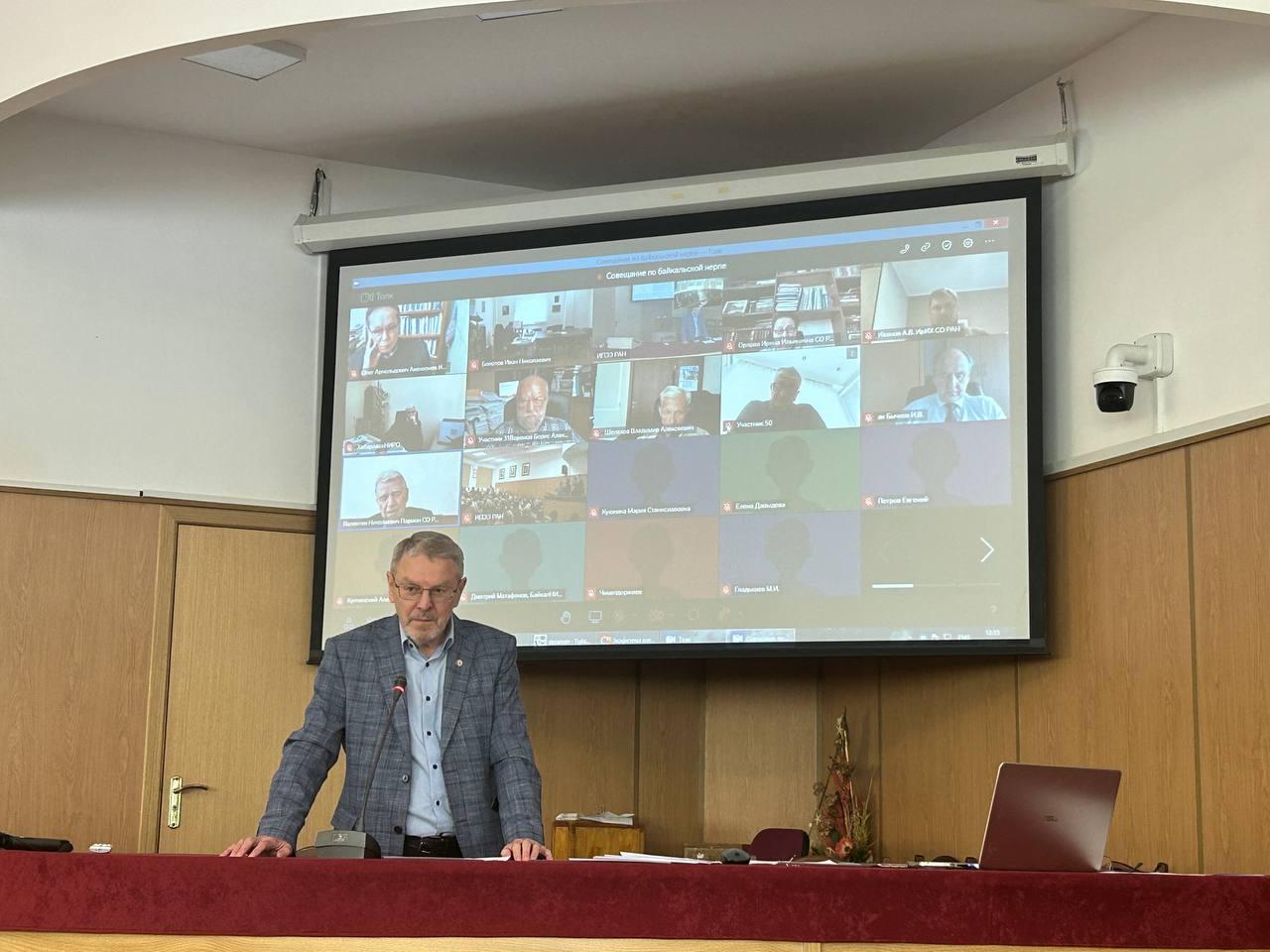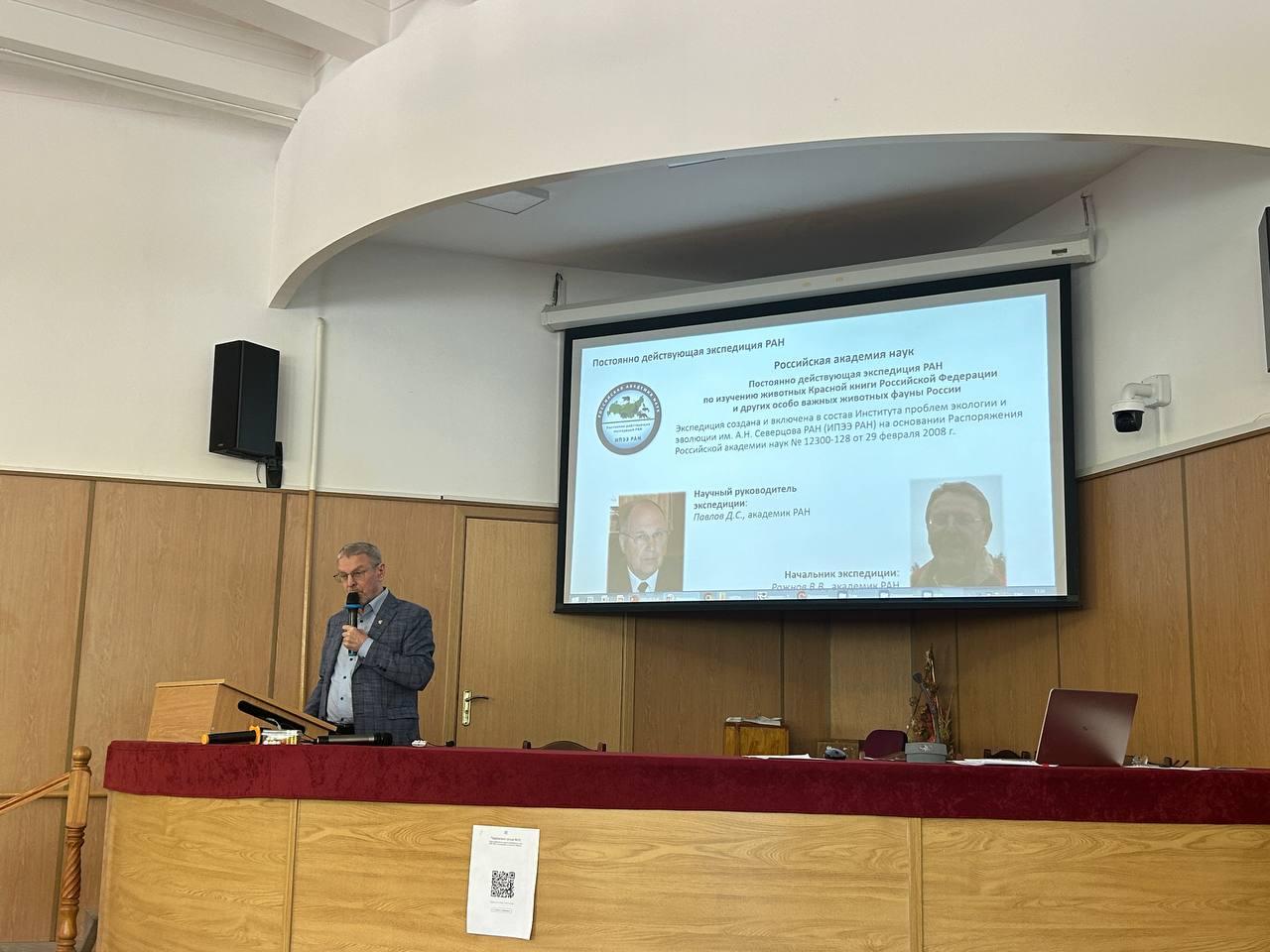
May 21, 2024 at the A.N. Severtsov Institute of Ecology and Evolution RAS (IEE RAS) an extended meeting of the Scientific Council of the Russian Academy of Sciences on problems of ecology of biological systems and the Scientific Council of the SBRAS on the problems of Lake Baikal was held on the topic “The ecosystem of Lake Baikal: State and factors that determine it.” The meeting was also attended by representatives of: the State Duma of the Russian Federation (Subcommittee for the Protection of Lake Baikal of the State Duma Committee on Ecology), the Ministry of Education and Science of Russia, the Federal State Budgetary Institution "VNII Ecology", the Federal State Budgetary Institution "VNIRO", the project office of the Federal Project "Preservation of Lake Baikal" of the National Project "Ecology", Ministry of Natural Resources of Russia, En+ Group company, Fund for Support of Applied Environmental Development and Research “Lake Baikal”.
Reports were made about long-term research in the river basin of Selenga in connection with environmental risks and threats to the Baikal ecosystem, about the features of the hydrochemical composition of the waters of the coastal waters of Lake Baikal and in the catchment area of the Selenga River (Republic of Buryatia, Trans-Baikal Territory, Mongolia) in the summer, about microplastics in the surface waters of Lake Baikal - its spatial distribution and long-term dynamics, about nanoplasticity - global trends and potential risks for Lake Baikal, about key habitats and movements of the Baikal seal, about the well-being of the Baikal seal as an indicator of the state of the ecosystem of Lake Baikal, about the results of counting its population, about the assessment of the content of genotoxic alkylating compounds in tissues of Baikal amphipods using lux-biosensors - their spatial long-term dynamics, the organization of biological monitoring systems for shallow and coastal ecosystems of Lake Baikal.

During the meeting, it was noted that the institutes of the SB RAS are carrying out state assignments of the Russian Ministry of Education and Science for the study of Lake Baikal, and at the Institute of Economics and Ecology of the Russian Academy of Sciences, with the support of a number of companies and foundations, the “Baikal seal research program (2020-2025)” is being carried out with the participation of the Federal State Budgetary Institution “VNIRO” and the Baikal Expedition on hydroecology, which during 2019-2023. operates on Lake Baikal and its main tributary, the Selenga River (in Russia and Mongolia). The Scientific Council on the Problems of Lake Baikal SB RAS has repeatedly noted that sections of state monitoring devoted to the hydrochemical composition of the waters of Lake Baikal in state reports “On the state of Lake Baikal and measures for its protection” contain data that can be assessed as erroneous.
Taking into account the variety of work carried out by different organizations and the inconsistency of the data presented at the meeting on the hydrochemical components of the waters of Lake Baikal and its tributaries, the need was noted for the formation of a unified scientific program, including conducting comprehensive monitoring studies of the Baikal ecosystem and key indicator species of its condition; conducting comprehensive research aimed at improving the legal regulation of the protection of the ecosystem of Lake Baikal and the sustainable socio-economic development of the Baikal natural territory, further holding joint meetings of the scientific councils of the Russian Academy of Sciences, the Siberian Branch of the Russian Academy of Sciences to discuss the problems of preserving Lake Baikal in order to consolidate scientific research and develop agreed scientific positions for presenting to government and management bodies. It was also proposed to hold a meeting with the participation of the Russian Ministry of Natural Resources and Roshydromet to discuss methodological and organizational issues related to the performance of hydrochemical analyzes of the waters of Lake Baikal and its tributaries, as well as consultations with Mongolian colleagues on issues related to the performance of hydrochemical analyzes of the Selenga River in Mongolia, as well as interlaboratory comparative tests to determine hydrochemical parameters based on Russian standard samples. Heads of scientific councils of the Russian Academy of Sciences, academician V.N. Parmon and academician V.V. Rozhnov, were asked to contact the Presidium of the Russian Academy of Sciences with a proposal to include in the Work Plan of the Presidium of the Russian Academy of Sciences for the second half of 2024 the question of the results of scientific research in the field of conservation of Lake Baikal and to develop a Strategy for the sustainable development of the Baikal Natural Territory and a road map for its implementation.
Based on the results of the discussion, the Scientific Council of the Russian Academy of Sciences on problems of ecology of biological systems and the Scientific Council of the SBRAS on the problems of Lake Baikal adopted a resolution and an appeal with relevant proposals to members of the scientific councils of the Russian Academy of Sciences, the Project Office of the Federal Project "Preservation of Lake Baikal" of the National Project "Ecology" of the Ministry of Natural Resources of Russia, Subcommittee for the Protection of Lake Baikal of the Ecology Committee of the State Duma of the Russian Federation, the Ministry of Natural Resources of Russia and Rosprirodnadzor, the Ministry of Education and Science of Russia and the Ministry of Foreign Affairs of Russia.
